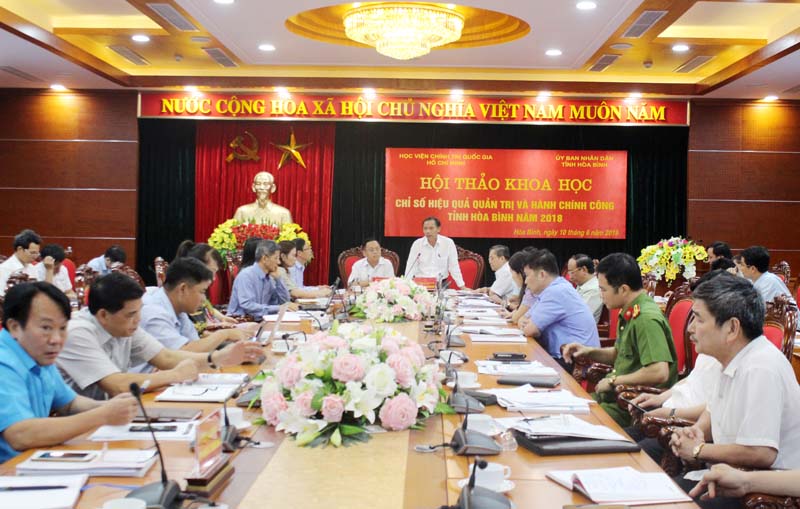
(HBO) - On June 10, Ho Chi Minh National Academy of Politics and the People's Committee of the province cooperated to organize a workshop on effective index of governance and public administration in Hoa Binh province in 2018
 The Overview of the workshop.
The Overview of the workshop.
The results of Provincial Governance and Public
Administration Performance Index (PAPI), which has been recently announced,
have shown that Hoa Binh is in the province group achieving a high average mark
of the country. However, there are still some content axes in the low or low
average group of the country such as the accountability to the people, the
corruption control in the public sector, the effectiveness of the environmental
management...
At the workshop, scientists from Ho Chi Minh National
Academy of Politics and the leaders from the provincial departments, branches
and localities exchanged and discussed the success and the failure in the
implementation of the public service staff. The workshop also focused on
clarifying the causes of the above limitations. Thereby, the specific and
appropriate solutions to the local situation in order to raise the people's
satisfaction level on the operation of the government were proposed.
Hoa Binh province is undergoing a dynamic transformation amid Vietnam’s national digital transition. Building on Poliburo’s Resolution No. 57-NQ/TW on breakthroughs in science, technology, innovation, and national digital transformation, the province has rolled out a wide range of practical action plans. A standout initiative is the "Digital Literacy for All” movement, an effort to ensure that no one is left behind in the digital era.
Hoa Binh province is undergoing a dynamic transformation in the wake of the national digital transformation movement. Building on Resolution No. 57-NQ/TW of the Politburo on breakthroughs in science, technology, innovation, and national digital transformation, the province has implemented a wide range of practical action plans. A standout initiative is the "Digital Literacy for All” movement ambitious effort to ensure that no one is left behind in the digital age.
With a spirit of unity and proactive problem-solving, the Party Committee, the government and the people of Dong Lai Commune (Tan Lac District) have made great strides in implementing the resolutions of the 24th Party Congress of the commune for the 2020 - 2025 term. Focusing on leadership and practical actions, the commune has brought the Party’s resolutions into daily life, creating strong impacts and pushing the local development forward.
Amid the nationwide push for digital transformation, young people in Hoa Binh Province are stepping up as dynamic pioneers, applying technology to enhance Youth Union operations and expand the reach of youth-led initiatives. Through creativity and adaptability, Youth Union organizations at all levels have introduced a series of practical solutions, contributing to modern governance and community development.
In recent years, An Nghia commune, located in Lac Son district, has stepped up administrative reform, focusing on improving the quality and efficiency of its single-window service unit for receiving and processing administrative procedures. These improvements have helped create favourable conditions for local residents and organisations to handle administrative procedures, contributing to the commune’s broader socio-economic development.
The Prime Minister-approved master plan to develop the multi-use value of forests ecosystems through 2030, with a vision to 2050, aims to improve the management and sustainable use of forest resources, create jobs, increase incomes, and improve the living standards of ethnic minorities, people in mountainous and remote areas, forest workers and those living near forests.



 The Overview of the workshop.
The Overview of the workshop.